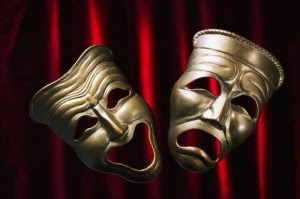Getting into character
The majority, if not all, of my writing seems to centre around characters. The interplay between them, their insecurities, their personal journeys. It's what people seem to note most when commenting on my stories. So I thought I'd put down some words as to what I think helps to craft good characterisation. It would be great to hear some of your thoughts too.
Firstly, observe. Before putting pen to paper I think there is a lot of value
in simply watching people and observing how they interact with others and the
world. Study how people act in the everyday, the beat and rhythm of
conversations, nervous tics, how people behave when they are uncomfortable,
when they are happy, and so on and so forth. See what stands out to you. I
remember being at Stansted airport waiting for a flight to Glasgow for
FantasyCon 2019 when we could all travel that more freely. Now airports are
great places to watch people. There's this vast array of life going on around
you. No different this time. Hundreds of lives unfolding before you, hundreds
of stories playing out. Yet one innocuous thing struck me. There was this
bloke, somewhere in his early fifties I would guess, slightly overweight but
not so much that you would notice, and he's standing there with his right hand
held out from his hip just ever so. And his first and middle finger were stuck
out in a slight V-shape with his thumb flicking at his middle finger every so
often. Smoker. Or ex-smoker at least. Now there's nothing remarkable there but
that one action glimpsed for a minute or so will get used by me at some point
in a story. And no one will really notice that it's in the story but it's a
little layer to add to a character.
Be diverse! People are this wonderful tapestry in life and you should be able to weave that into your stories. Try to make your characters stand out from each other. Give each character a voice and traits which are their own. Think about their vocabulary, whether they use slang words, what swear words they use (if any), and if they are a talker or are more taciturn. And if your characters are perpetually all of one background, be that based on ethnicity, sexuality, gender, age, disability, religion, social status or other traits, then maybe think about branching out and better reflecting the diverse society we live in. MariNaomi over at Midnight Breakfast, Kelly J Ford over at Dead Darlings, Kate Elliott at Tor.com and Arie Farnam on her blog all provide far better advice on writing characters from a variety of backgrounds than I ever could.
Be diverse! People are this wonderful tapestry in life and you should be able to weave that into your stories. Try to make your characters stand out from each other. Give each character a voice and traits which are their own. Think about their vocabulary, whether they use slang words, what swear words they use (if any), and if they are a talker or are more taciturn. And if your characters are perpetually all of one background, be that based on ethnicity, sexuality, gender, age, disability, religion, social status or other traits, then maybe think about branching out and better reflecting the diverse society we live in. MariNaomi over at Midnight Breakfast, Kelly J Ford over at Dead Darlings, Kate Elliott at Tor.com and Arie Farnam on her blog all provide far better advice on writing characters from a variety of backgrounds than I ever could.
Nobody is perfect! Whatever else you do, make your characters flawed! I don't know a single person who doesn't have some trait or other which makes them human rather than robot. Find out what that is for your character and use it. Personally I find the more flawed the character, the more interesting they are.
The sound of silence. I talked earlier about listening to people and conversations. Think about your own conversations in the day to day and how they play out. At some point someone will pause and that is when things change. Silence can be the quickening of a heartbeat as two people fall in love. Silence can also be the awkwardness of a word said in anger or a misinterpretation of a situation. When that moment of silence comes some people will fidget, some will look at their feet (anywhere but the other person), some will be comfortable and gaze with affection at their companion. Whatever happens, don't be afraid of your characters interacting in non-verbal ways.
All by myself. A lot of what we learn about a character's personality is often by what they are doing than what they are saying. In fact, you can develop characters massively when they are in a situation on their own with no other characters to interact with. Sometimes you might do this via inner monologues. Sometimes it's how they are interacting with the environment around them. Sometimes it's both.
The information dump! Okay, but your characters will probably have to communicate verbally at some point (they might not). As already noted, there is generally an unspoken ebb and flow to conversations. Almost as if you wait your turn. We generally tend to talk in short sentences before passing to the next person (though we all know the person who can talk non-stop). Have a listen when you're next chatting to someone even if that passing of the baton is someone else going "Uh huh," before passing back to you. Sometimes people will be listening to each other, other times they will be biding their time until they can make their killer retort. Now when writing stories there is the temptation, and I have done it, to use dialogue to provide massive information dumps. And you know what, that can work really well if handled properly. However, sometimes you will see characters go into lengthy monologues with barely a pause for breath. Try to find the right balance and think about how the interaction with other characters and the surrounding environment breaks up what can be a chunky bit of speech.
Reaction. Years ago I wrote a cliched script for a slasher film which has never seen the light of day and is probably better for it. In that script a head is found in the middle of a campsite by some college kids (I mentioned cliched, right?) who started talking calmly about how it had got there. Now I showed this script to my friend Phil who gave me this wonderful piece of advice. "For the love of God, have someone scream!" Now the scream here is not the most important message, it's the fact that no one on finding a severed head would simply go into detective mode. There needs to be an authentic reaction to whatever action has just taken place and this will vary from character to character.
Be true unto thine self. Or rather, have the characters be true to themselves. This sort of backs up my previous comments on reaction. Some traits will remain constant. For example, if a character hates coffee creams at the start of the story then it's highly unlikely that they are going to love them by the end. Equally, you will probaby want to see some personal journey for your characters throughout your story. Make sure that if that character evolves that it is believable. If you're going to have a confident individual reduced to a traumatised wreck by the end of the story then draw that transition out. Take the reader on that journey with the character. Don't just snap your fingers at the culmination and go 'Hey Presto!'.
Why am I here? Not an existential question. One more of relevance to the story. If a character is doing absolutely nothing in the scene or the story then think about whether you actually need them there.
The iceberg. Not everything about the character has to be on the page. Think of them like an iceberg; 20% visible, the other 80% beneath the surface. It's the same when you're meeting someone new. You get certain information about them but you don't get anywhere near all of it. Favourite foods, childhood experiences, what music they like, etc. Now you don't need to craft a 100 page thesis on your character and their backstory but it's useful for you to have in your head some salient details which helps you grasp some of the way that character reacts or is motivated. And in doing so you'll be surprised at how your character comes to life more on the page and also in your own head as their creator.
So that's about the majority of it, I'd say. Or at least what works for me. Hopefully there are some useful thoughts in there for you to make use of and I hope it resonates with your own experiences of writing and reading characters. I look forward to meeting the people you go and create on the page. Good luck.




Comments
Post a Comment